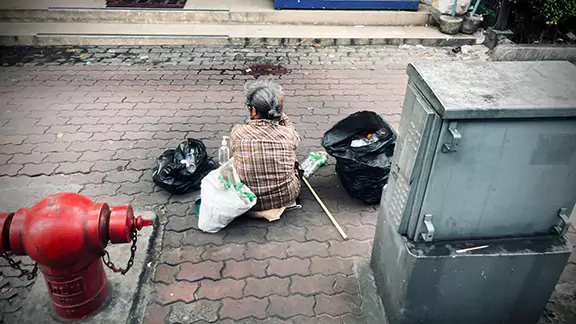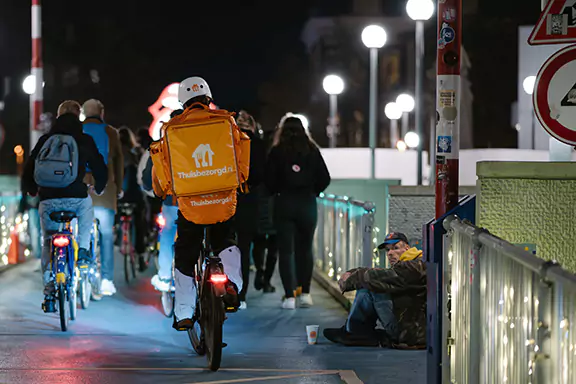Surely many of us may have had thought about this question: Why can’t homeless people simply find jobs so they can get off the street?
The reality is a lot more complicated. For starter, it can be extremely difficult for individuals experiencing homelessness to find employment. When one becomes homeless, things that used to be simple become challenging. Lack of a home address, for example, can be one of the biggest hurdles during job their job hunting, not to mention the skills and work experience required by most jobs nowadays
On the other hand, many homeless people do in fact have jobs, and some of them more than one. A 2021 study from the University of Chicago estimated that 53% of people living in homeless shelters were actually employed. Yet high housing costs and other living expenses have made it impossible for them to afford their own housing.
If you have become homeless and are looking for ways to meet your basic needs and earn a living, we’re here to help. This article will discuss what employment opportunities are there if you have become homeless, common barriers that homeless people may encounter during job hunting, and the support and resources they can access to help find jobs.
What to do if I don't have a Permanent Address?
Many jobs require applicants to have a permanent address, which basically preclude homeless person from the beginning of the application process.
Solutions : Reach out a local homeless shelter to ask for their permission to use their address for job applications. Some transitional housing programs also offer similar services. You can find the list of shelters, affordable housing and other relate resources in your area from the website of U.S. Department of Housing and Urban Development (HUD).
Alternatively, you may use the general delivery address provided by the local post office to receive mail. You can contact your local post office to inquire about the service and their specific policies and procedures. Remember, it’s important to be transparent and explain your situation to potential employers.
In addition, some libraries and community centers also allow homeless individuals to use their address for receiving mail. You can reach out to local libraries or community centers to inquire if they offer such services and understand specific policies and procedures.
What to Do if I Don't Have Identification Documents?
Many job applications require identification documents such as a driver’s license or Social Security card. If you have lost your personal belongings or identification while experiencing homelessness, applying for replacement documents can be time-consuming.
Solutions: Seek assistance from local homeless service organizations or shelters if you have no clue how to apply for a new identification document or having any issues during the application process. These organizations have resources or partnerships with agencies that can help you navigate the process, provide guidance, support, and sometimes even financial assistance for the application fees.
Explain your situation to your potential employer and inquire if they accept alternative identifications. For example, letter from service provider, shelter identification cards, or letters of reference from reputable individuals who can vouch for your identity.
How to Improve My Job Skills and Bridge Experience Gap?
Homeless individuals, particularly young people, may face challenges in meeting the skills and work experience required by many jobs. Without these necessary qualifications, they may struggle to compete in the job market.
Solutions: The federal and local governments, NGOs and community organizations provide a wide range of job assistance, including job training programs, for jobless and homeless people. You may get valuable skills training sessions, career counseling, and job search assistance from these programs.
For example, HUD’s Homeless Assistance Program (HAP) may provide vocational services specifically designed for individuals who are chronically homeless. These services aim to address the unique barriers and challenges faced by this population in gaining employment. You can also take advantage of free online tools and education resources to enhance your skills and knowledge.
If you’re a veteran, try the Homeless Veterans Community Employment Services for extra support. The program is created by U.S. Department of Veterans Affairs (VA) to provide job assistance for homeless veterans, including facilitating onboarding, other VA support on health care and housing and more. Check the Community Employment Coordinator contact list to find local assistance.
To acquire experience while homeless, consider starting from entry-level positions with minimum wage or exploring volunteer opportunities in your community or at local organizations. Although these opportunities may not ideal, they allow you to accumulate experience and expand your network, increasing your chances of securing a preferred job in the near future.
How to Do If I Have Limited Access to Reliable Communication?
Another barriers that most homeless individuals may face is the lack of consistent access to cell phone services or the internet. The limited access can hinder their ability to effectively communicate with potential employers.
Solutions: You may qualify for many government assistance programs when you have limited income while experiencing homelessness. For instance, Supplemental Nutrition Assistance Program (Food Stamps) and Lifeline Assistance Program (Lifeline).
Lifeline is a federally-funded program that provides low income families and individuals with access to affordable telephone or broadband services. Eligible customers can receive a discount on Lifeline plans of $9.25 per month.
Whether you have an income at or below 135% of the federal poverty guideline, or participate in other qualifying government programs such as Public Housing Assistance (FPHA) Section 8 or Veterans Pension and Survivor Benefit, you are eligible for Lifeline benefits.
If you apply for Lifeline benefits through a participating provider like EASY Wireless, you will be entitled to the EASY Wireless Unlimited Plan, which includes FREE unlimited data, talk, text and even a FREE smartphone if you meet specific conditions. EASY Wireless is a leading provider and a full-service cellular store that cares about all of your communication needs.
Drop by one of the EASY Wireless’s retail stores or simply get started by clicking the link below to start your seamless job searching journey:
See if you are eligible for FREE cell phone service, Click here!
That’s not all – EASY Wireless also provides an array of amazing accessories to enhance your mobile experience and is dedicated to providing exceptional service and ensuring you find the perfect plan, phone, and accessories to improve your life.

What to Do If I Have Health Issues or Substance Abuse Problems?
Some homeless individuals may face a range of complex challenges including mental health issues, physical disabilities and drug abuse issues, which can affect their ability to find or maintain employment. The lack of stable housing and limited access to healthcare can exacerbate their situations.
Solutions: There are government programs and NGOs to help you overcome the challenges and find employment, though they may not necessarily target homeless people.
One of such programs is the State Vocational Rehabilitation Services Program, which provides vocational rehabilitation services for individuals with disabilities and mental illnesses, aiming to prepare them for competitive job market.
Homeless individuals with severe mental illnesses or disabilities may also be eligible for disability benefits through the Social Security Administration (SSA). These benefits, such as Supplemental Security Income (SSI) or Social Security Disability Insurance (SSDI), can provide financial support and access to healthcare services.
For those who have drug abuse issues, substance abuse treatment programs can offer the much-needed professional assistance. These programs can be provided by government agencies or nonprofit organizations, offering treatments such as individual and group therapy, support groups, and education on addiction recovery.
What to Do If I Have Criminal Records
Employers may hesitate to hire people with criminal records. As a result, having a criminal record can further complicate the efforts of homeless individuals in finding employment.
Solutions: Nowadays, 37 states and over 150 cities and counties across the country have adopted the widely known “ban the box” policy, allowing candidate to apply for jobs without disclosing their criminal history. This has effectively reduced the discriminatory barriers faced by homeless individuals with criminal records.
In addition, the U.S. Department of Labor oversees various workforce development programs aimed at helping individuals with barriers to employment, including those with criminal records. For instance, the Reentry Employment Opportunities (REO) program provides funding to state and local agencies to offer job training, employment services, and reentry programs for individuals with criminal records.


